Running a business in today's fast-paced environment means wearing a hundred hats: founder, operator, fundraiser, and, like it or not, CFO.
But financial decisions are too important to run on gut instinct, and hiring a full-time CFO?
That’s often out of reach for most startups and lean teams.
This is exactly where Virtual CFO (VCFO) services come in. You get senior-level financial strategy, budgeting, forecasting, investor reporting, and cash flow planning, without the full-time cost or overhead.
Whether you're prepping for a funding round, trying to make sense of your burn rate, or just need someone to help you think clearly about your numbers, a Virtual CFO can offer clarity, structure, and serious financial leadership.
In this article, we'll break down what a Virtual CFO does, how they can transform your business, and whether virtual cfo services in 2025 are the right move for you.
Let’s dive in.
A Virtual CFO (VCFO) is a financial expert who provides CFO-level leadership to businesses on a flexible, outsourced basis. Instead of hiring a full-time executive, companies engage a VCFO for specific hours, projects, or growth phases, getting the same strategic input without the full-time cost.
Virtual CFO services are especially valuable for startups and small to mid-sized businesses, and even CPA firms that need financial leadership, but aren’t ready to commit to an in-house hire. From guiding cash flow strategy to preparing investor reports and board decks, a VCFO acts as your right hand in finance.
So what exactly do they do?
While bookkeepers track what happened, and accountants make sure it’s recorded properly, a virtual CFO focuses on:
In other words, a Virtual CFO doesn’t just manage your numbers; they help you use your numbers to drive decisions.
Most VCFOs today work remotely, but they plug directly into your business: joining strategy calls, collaborating with department heads, reviewing financial software, and keeping leadership informed.
With the right partner, outsourced CFO services can deliver the same level of insight as an in-house hire, minus the $250K salary and equity package.
Virtual CFO services aren’t just a cost-efficient alternative to hiring a full-time CFO; they’re often the strategic edge that separates high-growth companies from ones that stall out.
Here's how cfo services can boost real, measurable business success:
Most businesses generate financial reports, but don’t know how to act on them. A virtual CFO bridges that gap.
They help you interpret what the numbers mean:
With this clarity, you make data-backed decisions, not guesses.
Fundraising doesn’t start with a pitch; it starts with clean, investor-ready financials. VCFOs help you:
Whether you’re raising a seed round or preparing for Series A, a virtual CFO becomes a critical part of your investor story.
Most startups rely on spreadsheets until it’s too late. Virtual cfos use structured approaches to bring order:
This kind of foundation doesn't just keep you compliant, a skilled cfo ensures you're prepared for faster growth and smoother audits.
One of the most common reasons businesses fail? Running out of cash, not profit.
A virtual CFO helps you:
This isn’t just bookkeeping, it’s forward-looking cash management, built for survival and scale.
When you don’t have financial clarity, every big decision feels risky. Virtual CFOs remove that friction.
You stop spending hours in spreadsheets or second-guessing financials, and start focusing on:
That shift alone can change the pace and quality of how your business grows.
If you’re hitting growth inflection points or just tired of flying blind, a Virtual CFO brings the kind of financial leadership that pays for itself in better decisions, smoother operations, and long-term confidence.
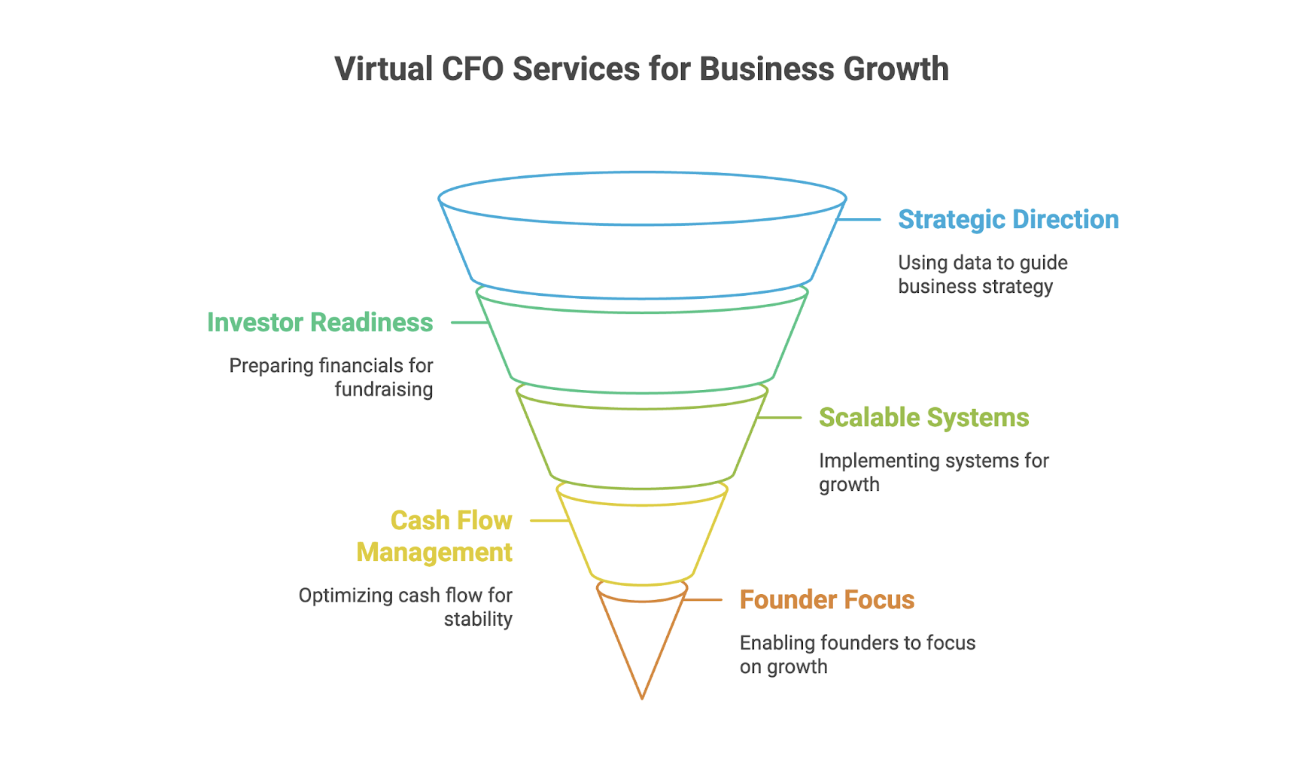
Startups move fast. But when your product is scaling and your team is growing, financial blind spots can be costly. That’s where Virtual CFO (VCFO) services come in, not as a luxury, but as a strategic advantage.
A good VCFO doesn’t just manage your books. They act as a starters' cfo and financial co-pilot, aligning your runway, burn, hiring plans, and investor strategy into a coherent, actionable roadmap.
Here's how virtual cfos help startups benefit from bringing financial expertise into the picture.
Hiring a full-time CFO in the U.S. often means paying $200,000+ in base salary, equity, and benefits, a steep ask for any early-stage company. But financial guidance isn’t optional.
Virtual cfos provide flexible access to executive-level finance expertise to executive-level finance expertise at a fraction of the cost. This means:
For seed and Series A startups, especially, this model allows you to build financial infrastructure early, without overextending your resources.
Many startups either don’t forecast at all or build one version that quickly becomes obsolete. A good VCFO integrates forecasting into their actual operating rhythm.
Instead of just static spreadsheets, you get:
This turns finance from reactive to strategic. Founders can make decisions with confidence instead of crossing their fingers.
Startups often overspend in two places: tools and talent. Without checks in place, software subscriptions stack up, marketing budgets run over, and hiring happens faster than revenue can support.
Virtual CFOs provide systems for disciplined growth:
This isn’t about cutting, it’s about clarity. Knowing what you should be spending helps avoid emergency corrections later.
VCs don’t just fund good ideas. They fund founders who understand the numbers.
A VCFO helps you prepare for fundraising by:
It’s not uncommon for VCFO-led startups to run smoother diligence processes and even command better terms because their numbers instill confidence.
Whether it’s testing pricing, entering a new market, or adjusting team size, startups face high-stakes decisions with incomplete information. A virtual cfo can provide clarity to reduce that uncertainty.
You get:
This cfo support creates faster, more informed decisions
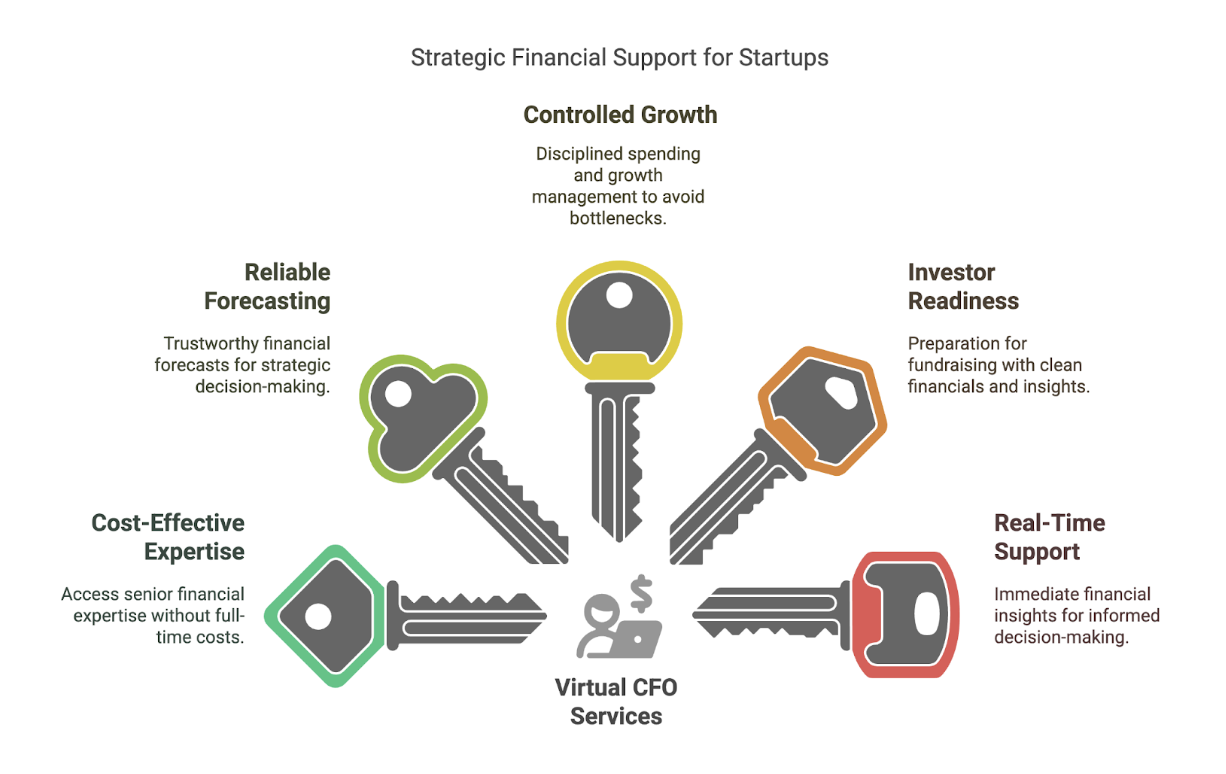
Understanding pricing is often a key concern for businesses turning to virtual cfos for the first time, especially when deciding between hiring surface-level support or investing in long-term financial leadership. Pricing typically falls into three models: hourly rates, monthly retainers, and value/project-based pricing.
Here's how each one breaks down for U.S. businesses in 2025:
Who this fits: Ideal for startups needing help with specific tasks, such as fundraising support, audit prep, or a one-off financial model.
Who this fits: Companies that need ongoing strategic guidance, like board preparation, cash management, and scenario planning, without the cost of a full-time CFO.
That can mean saving 60–80% for similar-quality financial leadership, but only paying for the time and impact you need.
Engaging a Virtual CFO gives you flexible, high-impact financial leadership at a fraction of the cost of a full-time hire. And for U.S.-based firms, especially those pursuing growth or investment, it's often the smartest investment you can make.
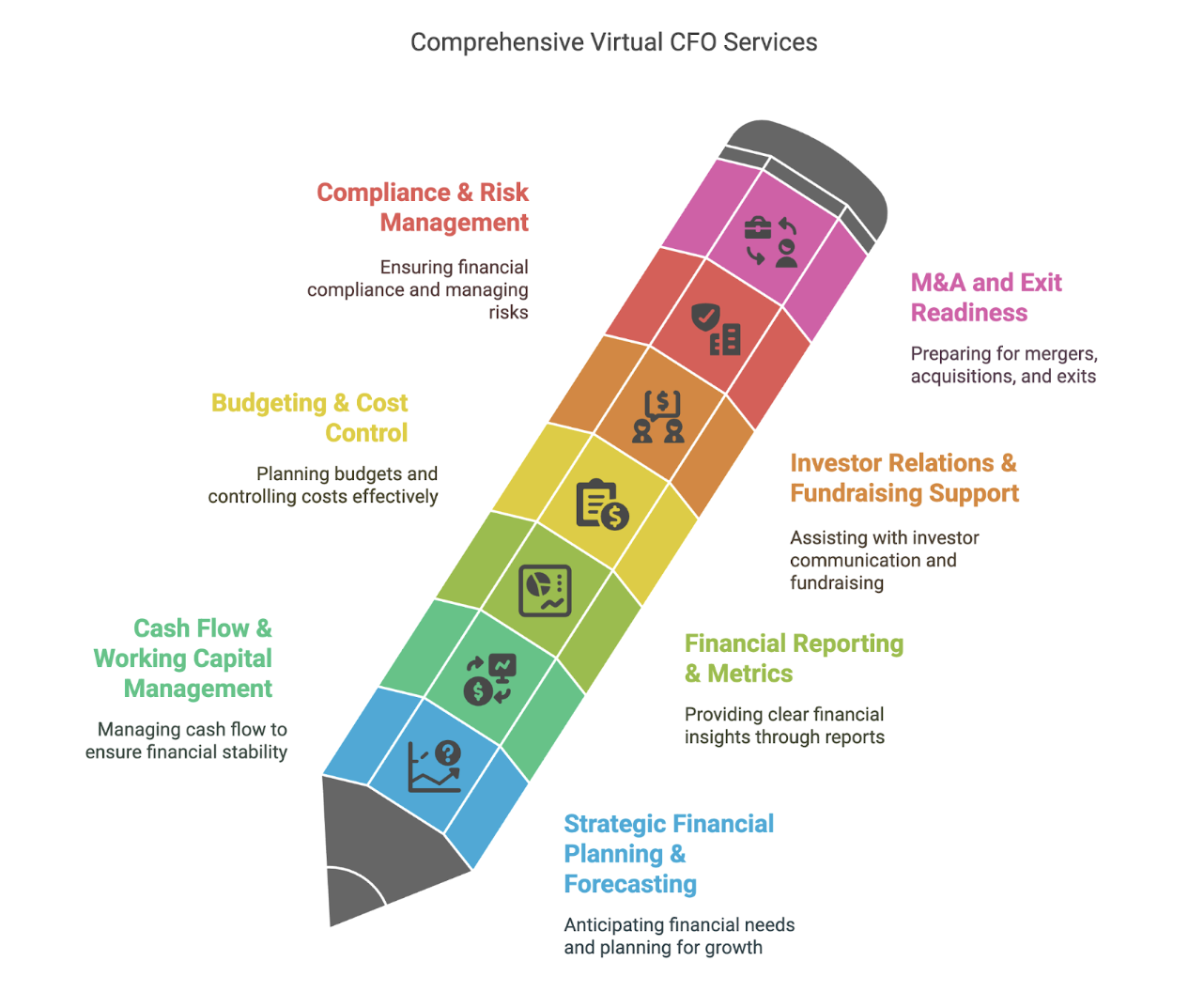
A Virtual CFO isn’t just an outsourced accountant; they're your strategic financial guidance partner. For startups and small businesses, especially those in growth phases startups and mid-market firms that need high-level financial expertise without the full-time cost, a virtual cfo offers a broad spectrum of services designed to drive smarter decisions, tighter cash management, and investor confidence.
Here's what virtual cfos offer when you hire them:
A VCFO helps you see around corners. This includes:
📌 Example: A SaaS startup unsure about hiring 5 engineers next quarter can rely on their VCFO to build a model showing the impact on burn rate and runway.
Running out of cash is one of the top reasons businesses fail. A Virtual CFO:
Investors and founders need clean, actionable numbers, not cluttered spreadsheets. A VCFO will:
📌 For CPA firms: A Virtual CFO can design reporting templates to improve client transparency and reduce internal review times.
Budgets aren’t just for control, they’re for clarity. A VCFO will:
Raising money? A virtual CFO can help you look investor-ready:
📌 Early-stage startups with VCs often find that investors prefer working with companies that have a seasoned VCFO
While a virtual cfo ensures compliance, they don't replace your CPA:
Thinking of selling or acquiring? A VCFO:
Hiring a Virtual CFO (VCFO) isn’t just about budgets; it’s about timing, complexity, and growth. To help startup founders assess when it’s the right time, here’s a simple framework:
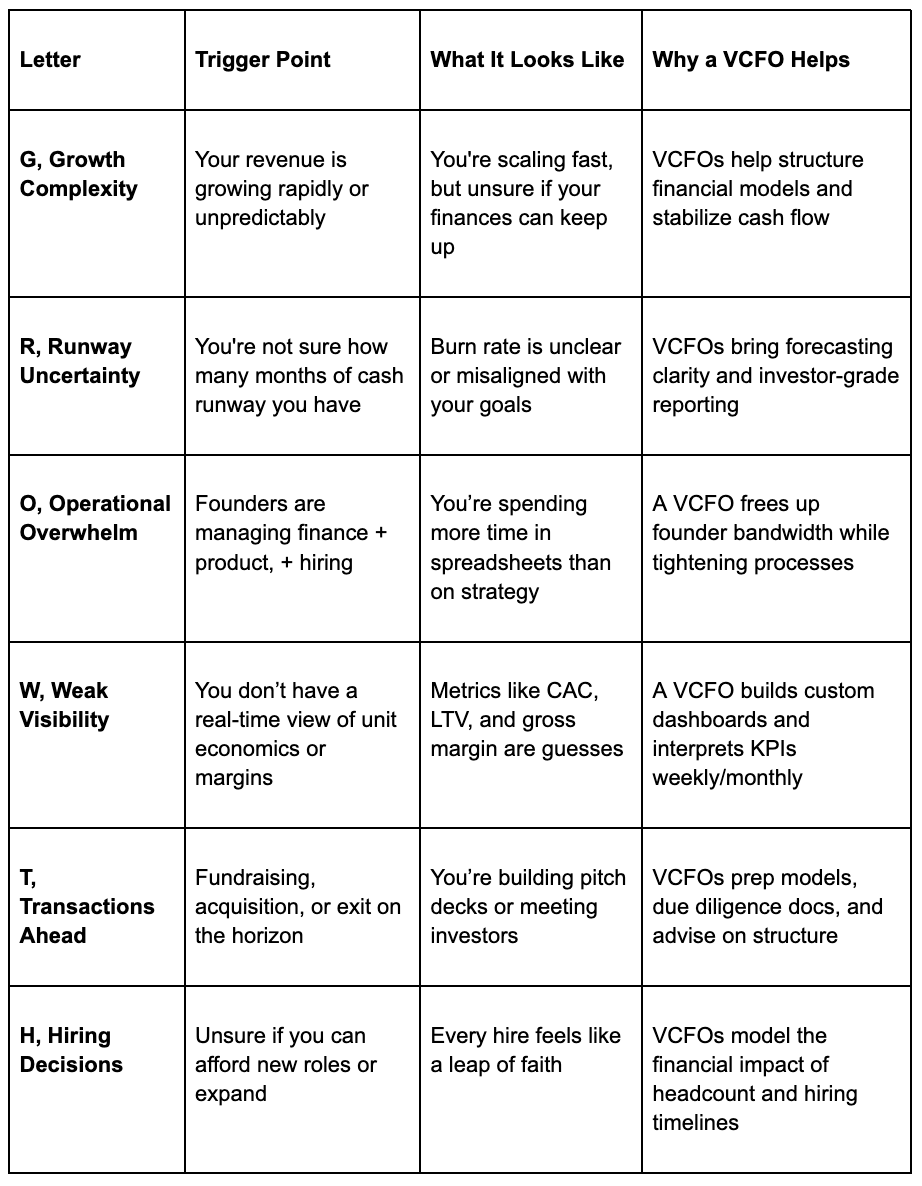
Just for context 😉, you’re reading this on the Madras Accountancy website. If anything in this post feels relevant to what your startup is facing, we’re here to help. Our work with U.S.-based startups and growth-stage companies to bring financial clarity without the full-time overhead.
👉 Not sure what you need yet? Contact us, and we’ll help you figure it out.
Not sure whether to hire a fractional CFO or find the right virtual cfo service for your business? Let’s walk through a few real-world startup scenarios:
You need:
→ You need a Fractional CFO.
Why? A seasoned finance leader with capital markets experience will guide you through high-stakes decisions, even if you only need them 10 hours a month.
You need:
→ You need a Virtual CFO.
Why? A remote team with accounting ops + strategic finance can plug in instantly and give you clean numbers every month, without hiring full-time staff.
You need:
→ You need Virtual CFO + Outsourced Accounting.
Why? This is where platforms like Madras Accountancy come in, a U.S.-focused virtual CFO solution that gives you clarity and control, without building an in-house finance team.
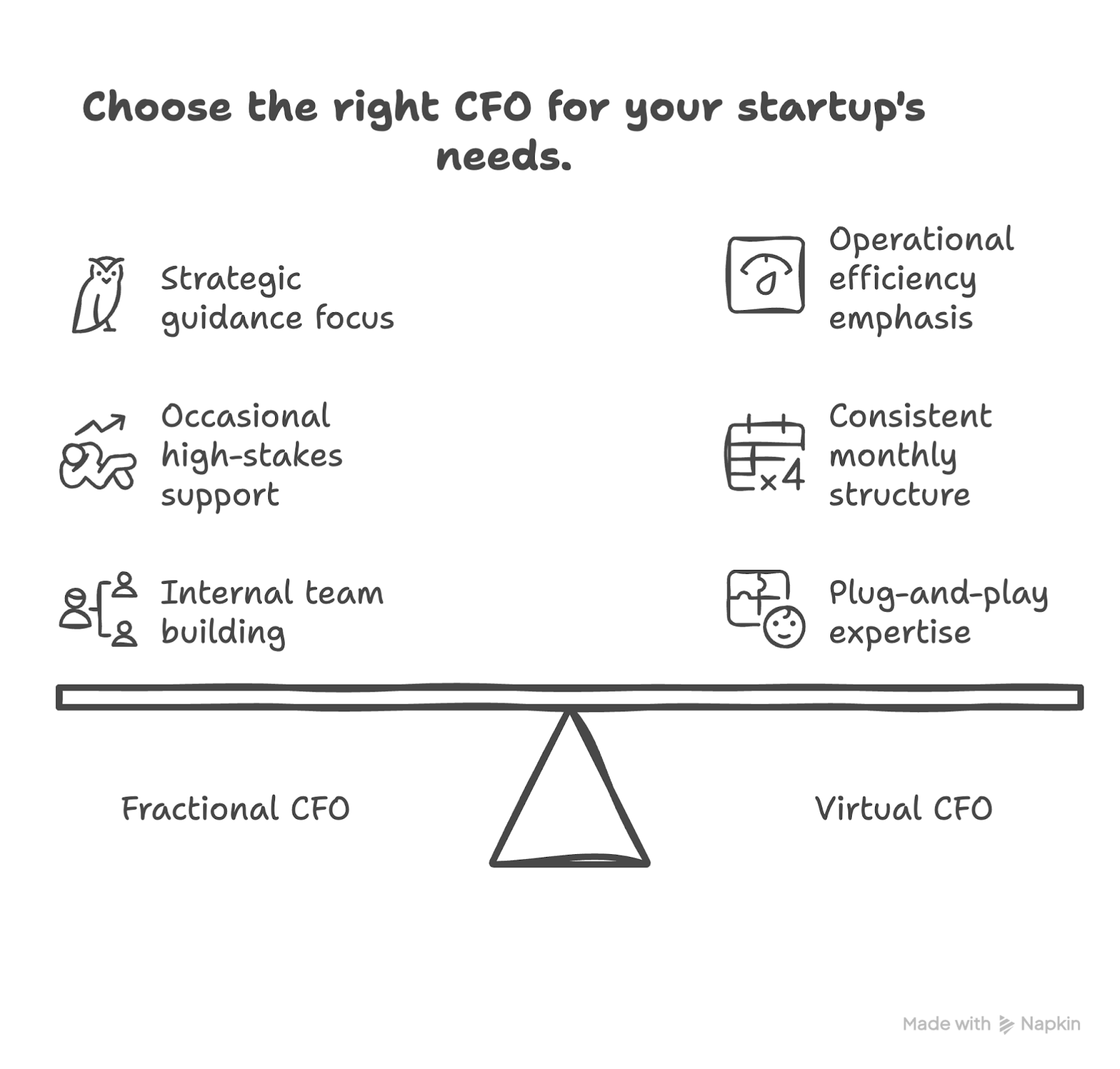
📌 Still confused? Let’s talk.
Madras Accountancy’s services help U.S. startups turn messy finances into strategic clarity. No fluff. Just clean, compliant numbers, fast.
Virtual CFO services in the U.S. typically range from $3,000 to $10,000/month, depending on your company’s size, complexity, and the scope of services needed. Some firms offer hourly rates (around $150–$400/hour), while others operate on fixed retainers. It’s significantly more affordable than hiring a full-time CFO, which can cost $200,000+ annually, including benefits and equity.
If your startup is scaling fast, planning a funding round, or struggling with cash flow visibility, it’s time to consider a VCFO. Other signals include:
Yes. Most virtual CFOs (especially those with startup experience offer flexible cfo engagements, from a few hours per month to full-time support during critical periods like fundraising, audit prep, or expansion planning. You don’t need to commit to a full-time contract.
Accounting firms focus on compliance, taxes, bookkeeping, and audit prep. CFO solutions go deeper into strategy than traditional accounting. They help you plan cash flow, model growth, handle board reporting, and make sense of your financials at a leadership level.
In short, they help you use your numbers, not just record them.
At Madras Accountancy, our VCFO model is purpose-built for U.S.-based startups, CPA firms, and growing businesses. We combine senior financial expertise with:
We don’t just plug in, we embed into your business.
Getting started is easy. We begin with a discovery call to understand your goals, challenges, and financial priorities. From there, we assemble a tailored VCFO team that integrates into your systems and supports your business from Day 1, with no bloated onboarding or unclear timelines.
As startups and growth-stage companies navigate tighter margins, tougher investor expectations, and faster growth cycles, financial clarity isn’t optional; it’s essential.
Virtual CFO services have become the preferred cfo solution for growing businesses, offering exactly that:
For founders and finance leads who want to stop reacting and start planning, a VCFO is no longer a nice-to-have; it's a competitive edge.
And if you've read this far, you're likely already asking the right questions.
Let’s Make the Numbers Work for You
You're already on the Madras Accountancy website, and that means you're one step away from clarity. We’ve helped dozens of U.S. startups get serious about their finances with virtual CFO services built for scale, speed, and security.
👉 Not sure what you need yet? Contact us, and we’ll help you figure it out.

A practical comparison of hiring a freelancer vs using a dedicated offshore accounting team, focusing on continuity, quality control, security, and scaling.

How CPA firms outsource payroll and 1099 work to reduce penalties and admin load, with a clean workflow for approvals, filings, and year-end reporting.

Practical do's and don'ts for CPA firms outsourcing accounting work, based on common failure points and what successful rollouts do differently.